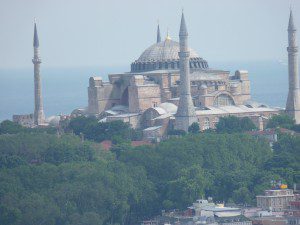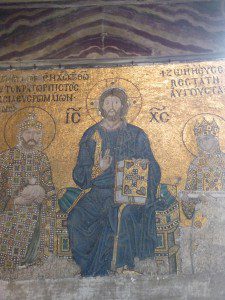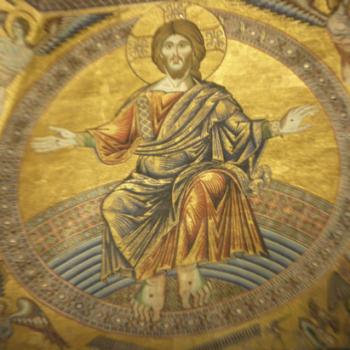We need the history lesson first and then the lesson in what to do follows. If even the President is worried about the Crusades (so long ago!), perhaps we’d better get the context to get direction.

The Christ in Christianity comes first: Jesus was the Prince of Peace and this fact embarrassed Christians in more militant eras. If you are looking for a War Lord in worldly matters,the Prophet of Islam was a better candidate. Jesus loved his enemies, the Prophet killed them.
Jesus Christ separates Christianity from other ideologies and religions that glorify conflict. As a result, when the cool kids want to kill, Christians are on the outside. We don’t like killing on principle and as Christian ideas have spread, violence has decreased. When Christian ideals falter, killing increases.
Examples and warnings are easy to find. The social Darwinism of the early twentieth century was as responsible as anything for the end of the Pax Britannica. Secularized elites decided to get rid of some of the great unwashed, unfit on Darwinian grounds, and manipulated them with civil religion to the killing fields of Belgium. Meanwhile, in the Soviet Union and in China during civil wars and in “peace,” secularism demanded the liquidation of civilians. Atheism was more cruel, and remains more cruel in Red China and North Korea than any religious regime on earth this side of ISIS.
We do not hear enough about the suffering Chinese and Koreans of this and the last century.
In the midst of all of this violence, the poor Crusades have come in for condemnation from the highest office in the land. As wars, they are a mixed target for condemnation: some Crusades were plainly wicked and others more mixed, like all human wars are. On the whole, the Crusades were a missed opportunity for Christendom to unite and defeat political Islam. The opportunity was squandered in bickering and bad behavior. They don’t deserve the condemnation they receive, but they also are a sad, not a triumphant, story.
Christendom is the unified power of Christians living this side of Christ’s eternal kingdom at the end of the age. It is not the Church, but the outworking of the Church in this age. Churchill was right: Christendom and her allies defeated Naziism. John Paul II was right: Christendom and her allies defeated the Soviet Union.
Christendom checked, but did not quite defeat militant Islam in another age. We call this failure the Crusades.
A defensive war against an aggressive power is easy to justify unless you are a pacifist and most Christians are not pacifists. The Roman Empire of the East, we call it Byzantium, had just defeated her Persian foes and rescued Jerusalem and the True Cross when an Islamic army boiled out of Arabia. It came, it saw, it conquered and made the majority Christian population of Palestine second class citizens for centuries.
The Romans could not fight Islam alone and so they called on the West for help and eventually the West came. The First Crusade was a defensive fight that restored Christian rule over Palestine for a century. The Crusades that followed were less successful, but delayed Islamic aggression for centuries so that by the time the Great City, Constantinople, fell to the Islamic invaders, the force of Islam was already past her peak.
Not for nothing was European blood spilt.
Nobody would justify the evils done during the Crusades. The Crusaders were sometimes brave, sometimes cowardly. They fought for God, they fought for gold. Some were humble and knightly, others were base traitors. The Crusader Kingdoms ended up treating the majority Christian population, mostly Orthodox, worse than some of the Islamic tyrants.
And when the Fourth Crusade sacked Constantinople, weakening the Minis Tirith of the ancient world, there was no justification for the deed. The Pope condemned it, but the damage had been done.
War is never very good . . . only justified. The First Crusade was just, but executed stupidly. The chief error on the part of the Crusaders was to set up independent kingdoms and alienate the still powerful Romans in Constantinople. The Romans and the Crusaders never recovered from the split.
This is the lesson: if one goes to war, then one must not fight with natural allies. The Crusader states were miles from home and hard to sustain. They made their closest ally, Rome, angry and alienated local Christians. The divisions of Christendom doomed the cause of rescuing the Christians of the Holy Land to failure, ridicule, and condemnation.
If Christendom had united, East and West, there just might be a Roman constitutional monarchy stretching across much of the Middle East bringing law and order. The divisions in the Church doomed the Christian cause to failure.
And so we often find it.
If a shooting war must come, and sometimes it must, we must fight our foes and not alienate allies. We must find those who mostly agree with us and make friends of them and not let family quarrels doom our cause. There is little power left in Christendom and a crusade is impossible, even if it were desirable.

Yet from the ancient Crusaders we can learn three lessons. We must never alienate the people of the nation we come to rescue. We must never quarrel with natural allies over issues small in comparison to what unites us. We must not confuse the temporary victories or defeats of our time with ultimate triumph or defeat of the Church.
We are churchmen in Christendom, but Christendom is shattered beyond repair in this lifetime. Perhaps it is better so, but what is left of us must find allies, such as Israel, who are imperfect but superior to our foes. We must defend what can be defended, preferring an imperfect Washington where we can worship to Arabia dominated by the House of Saud where we cannot.
We know God is not an American and is not wholly on the side of any one party, but we also know that Christians are dying in Syria and Iraq and that we must do what we can. Better to live under elites who prefer Vegas immorality to elites who chop off our heads. Better Israel than Syria. Better Britain than Iraq.
We do not need a Crusade, we could not call one if we did, but we need to stop apologizing for good done by the First Crusade. We should not repeat its mistakes, either.











